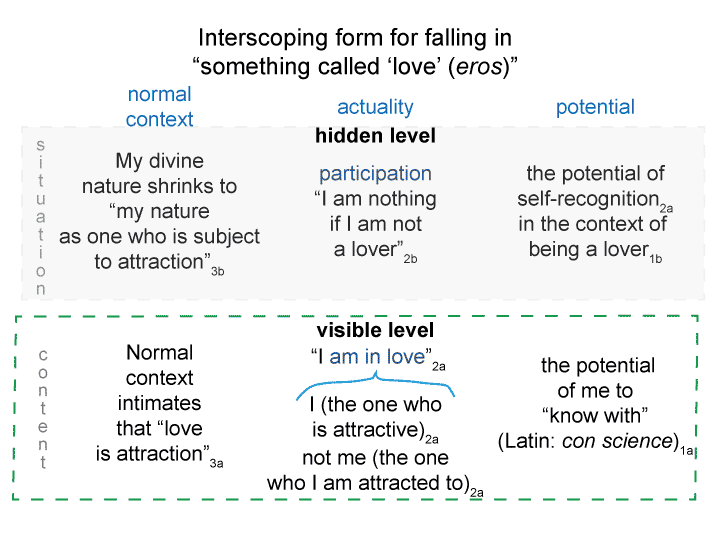Monthly Archives: June 2016
Man and Sin by Piet Schoonenberg (1964) 2.2W
Summary of text [comment] page 72
[The second is the intersection showing the tension between ‘I recognize myself’ and ‘human nature is to participate in divine nature’.
Let me suppose that ‘love’ is ‘agape’.
Suppose the single actuality is ‘the state of brotherly love’. One would imagine this state to be a state of grace.
But, consider 1 John 4:20. If anyone says, ‘I love God’, yet hates his brother, he is a liar. He who does not love his brother whom he has seen cannot love God whom he has not seen.
In this case, the axis of recognition is visible. The person proclaims “his” recognition of “his” love for God.
The axis of participation is more hidden. The person (secretly) hates “his” brother.
What is the theological twist in 1 John 4:20?
Observe. The divine object is a lie.]
Man and Sin by Piet Schoonenberg (1964) 2.2U-2
[What has the person not seen?
Perhaps, “she” has not seen the situation-level nested form. “She” has not seen how “her” divine nature situates “her” feelings of attraction. “She” becomes smaller. In modern terms, “she” objectifies “herself”. “Her” carnal expectations situates “her” feelings of attraction.
“She” does not sense “her” self-destruction.]
Man and Sin by Piet Schoonenberg (1964) 2.2U-1
Summary of text [comment] page 72
[The first is the interscoping nested form for ‘something called ‘love’.
Let me suppose that ‘love’ is ‘eros’.
The person sees the content-level, where “she” is attracted to “her” love. “She” loves being in love. “She” sees the erotic.]
Man and Sin by Piet Schoonenberg (1964) 2.2T
[To me, 1 John 4:20 calls to mind a question about the interscoping and intersecting nested forms:
Is one of the forms ‘visible’ and the other ‘hidden’?
Let me consider two examples.]
Man and Sin by Piet Schoonenberg (1964) 2.2S
Summary of text [comment] page 72
Schoonenberg quoted 1 John 4:20. If anyone says, “I love God”, yet hates his brother, he is a liar. He who does not love his brother whom he has seen cannot love God whom he has not seen.
Is ‘love for what we see’ intrinsic to ‘the love for what we do not see’? When we love our fellow human in his deepest reality, we love him, implicitly or explicitly, in God.
Man and Sin by Piet Schoonenberg (1964) 2.2R
Summary of text [comment] page 71
[In sum, ‘the idea of natural love’ is pure propaganda.
It moves the interpellated person away from what the human evolved to be.
Where does one see this idea propagated in contemporary society?
On television and in the movies?
In popular books and magazines?
Wake up.
Does anyone writing for popular television, movies, books and magazines suffer the consequences of misleading their consumers?
Let the buyer beware.
‘Natural love’ sells, just like perfume.]
Man and Sin by Piet Schoonenberg (1964) 2.2Q-2
[By extension, this also applies to agape.]
Schoonenberg asserted:
No love is possible on any level without conversion from sin. Without grace, a sinful man is incapable of any love, natural or supernatural.
Man and Sin by Piet Schoonenberg (1964) 2.2Q-1
[Another way to put that is:
‘Natural love (especially eros, the emphasis here) is an idol.
An idol is neither supernatural nor natural.]


